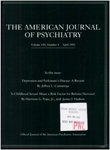Evidence for less improvement in depression in patients taking benzodiazepines during unilateral ECT
Abstract
Among 48 patients with diagnoses of depression according to DSM-III, there was a significant relation between therapeutic failure of unilateral ECT, as measured by scores on the Hamilton Rating Scale for Depression, and the concomitant use of a benzodiazepine. Of the 34 patients who showed a good therapeutic response to unilateral ECT, those taking benzodiazepines had smaller changes in their Hamilton depression ratings from before treatment to after treatment and were more symptomatic at the end of the course of ECT. Thus, when patients take benzodiazepines during a course of unilateral ECT, the maximum therapeutic response may be compromised.
Access content
To read the fulltext, please use one of the options below to sign in or purchase access.- Personal login
- Institutional Login
- Sign in via OpenAthens
- Register for access
-
Please login/register if you wish to pair your device and check access availability.
Not a subscriber?
PsychiatryOnline subscription options offer access to the DSM-5 library, books, journals, CME, and patient resources. This all-in-one virtual library provides psychiatrists and mental health professionals with key resources for diagnosis, treatment, research, and professional development.
Need more help? PsychiatryOnline Customer Service may be reached by emailing [email protected] or by calling 800-368-5777 (in the U.S.) or 703-907-7322 (outside the U.S.).



